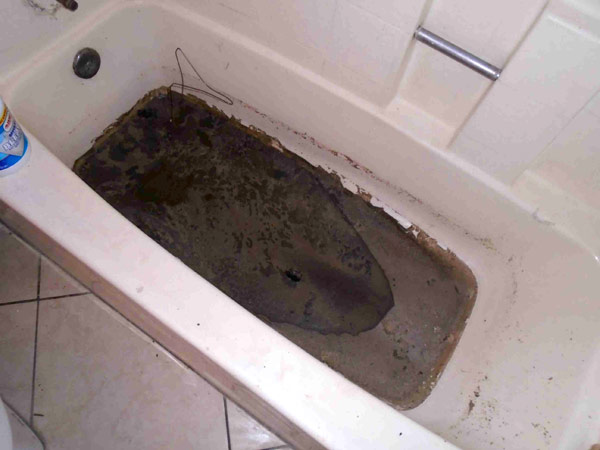The Definitive Explanation: Effluent Coming Up Through the Bathtub
The Definitive Explanation: Effluent Coming Up Through the Bathtub
Blog Article
Just how do you really feel with regards to Why is There Sewage Coming Up Through the Bathtub?

Sewer backup in the bath tub can be a stressful and unsanitary problem for any kind of property owner. Not just is it bothersome, yet it also positions major wellness dangers and shows underlying issues with the plumbing system. Recognizing why sewage is turning up via the tub is important for taking suitable action to attend to the trouble properly.
Intro to the Problem
Usual Reasons for Sewage Back-up
Clogs in the Sewage System Line
Among the most typical causes of sewer back-up is a clog in the drain line. This can happen because of the accumulation of debris, grease, or foreign things in the pipes, avoiding proper circulation and causing sewer to support into your bath tub.
Tree Root Invasion
Tree origins seeking dampness and nutrients can infiltrate sewage system lines through little fractures or joints. Over time, these roots can grow and broaden, creating considerable damage to the pipes and causing sewage backup concerns.
Understanding the Problem
When sewer draws back up right into the bath tub, it's a clear sign of a trouble with the drain system. The wastewater that must be streaming far from your home is instead finding its way back right into your space, which can cause significant damage and carcinogen.
Potential Reasons
A number of aspects can contribute to sewer back-up in the bathtub. From obstructions in the sewer line to problems with the plumbing framework, identifying the source is necessary for locating an option.
Aging Framework
Older homes may have dated plumbing systems that are a lot more susceptible to corrosion, cracks, and deterioration. As pipes age, they come to be more vulnerable to leaks and blockages, increasing the possibility of sewer back-up occurrences.
Heavy Rainfall or Flooding
During periods of heavy rainfall or flooding, the drain system might end up being overwhelmed with excess water, creating backups and overflows. This can result in sewage backing up into bathtubs and various other fixtures inside the home.
Indicators of Sewage Back-up
Foul Odors
Undesirable odors rising from drains or components, particularly in the washroom, might show sewer back-up concerns. These smells are often solid and persistent, indicating an issue that calls for prompt interest.
Slow Draining Fixtures
Bath tubs, sinks, and bathrooms that drain gradually or not in any way could be experiencing sewage back-up. If several fixtures are affected concurrently, it's likely that the issue stems from a common factor, such as the primary sewer line.
Gurgling Noises
Unusual gurgling or gurgling noises originating from drains pipes when water is running in other places in the house are a measure of air entraped in the plumbing system. This air buildup can arise from sewage backup and should be investigated promptly.
Health And Wellness Threats Related To Sewer Backup
Contamination of Water Supply
Sewage backup can contaminate the supply of water in your home, posing a severe health and wellness danger to you and your household. Exposure to infected water can result in stomach concerns, skin infections, and various other illnesses.
Mold Growth
Dampness from sewage back-up can create suitable problems for mold and mildew development in your home. Mold spores can exacerbate respiratory troubles and cause allergies in delicate individuals, making timely clean-up necessary.
Spread of Illness
Sewer consists of harmful microorganisms, viruses, and bloodsuckers that can trigger a range of illness, consisting of liver disease, cholera, and gastroenteritis. Entering into contact with sewer or polluted surface areas puts you in danger of infection.
Tidying up After Sewer Backup
Sanitation Procedures
Completely disinfect and sterilize affected locations after sewer backup to eliminate hazardous germs and stop mold development. Use suitable cleansing products and safety gear to guarantee safe and reliable cleaning.
Repair of Affected Locations
Repair any kind of damages to flooring, walls, or fixtures caused by sewage backup. Depending upon the extent of the damage, you may need to replace carpeting, drywall, or other products to restore your home to its pre-loss condition.
Immediate Actions to Take
Switching Off Water
In case of sewage backup, it's necessary to switch off the water to stop additional contamination and damage. Situate the primary water shutoff valve in your home and closed it off until the concern can be resolved.
Getting In Touch With a Specialist Plumber
Managing sewer backup is not a DIY task. Contact a licensed plumber with experience in taking care of sewage-related issues to analyze the circumstance and do required fixings or cleanups.
Staying Clear Of Contact with Infected Water
Till the sewer back-up is fixed, avoid contact with polluted water to prevent the spread of microorganisms and virus. Wear protective gear if you should be in the affected location and wash your hands extensively afterward.
Preventive Measures
Regular Upkeep of Sewer Lines
Set up routine examinations and upkeep of your drain lines to determine and address possible concerns prior to they escalate right into major troubles. This can include cleaning out debris, examining for tree root intrusion, and repairing any type of damaged pipelines.
Setting Up Backwater Valves
Consider installing backwater shutoffs in your plumbing system to prevent sewage from flowing back into your home throughout durations of heavy rainfall or flooding. These valves automatically close when water draws back up, safeguarding your residential or commercial property from contamination.
Appropriate Disposal of Home Waste
Prevent purging anything other than toilet paper and human waste down the commode to stop clogs and clogs in the drain line. Dispose of oil, oil, and various other home chemicals correctly to decrease the risk of plumbing issues.
Why Is Water Backing Up in My Bathtub When I Flush My Toilet?
What to do about a sewer line clog
First, don’t bother with plunging. No amount of plunging will dislodge the clog in a sewer line. The clog is too far away. Plungers are for clogs in the toilet itself, not the sewer line. Plus, the most likely causes of a sewer clog are:
Tree roots Flushed toys or feminine products Grease buildup Those items don’t move easily. And in the case of tree roots, the roots need to be cut out of the pipe and the pipe will need to be repaired.
You’ll need a closet auger. A closet auger is a type of plumber’s snake with a protective cover to keep from scratching the delicate porcelain toilet. If the clog is further down, you may need to remove the toilet or use one of your cleanouts to get to the clog.
We also recommend doing a video inspection of the drain to ensure that the cause of the clog has been completely removed. Otherwise, you could have the same problem again in a few days or weeks.
https://mspplumbingheatingair.com/blog/why-is-water-backing-up-in-my-bathtub-when-i-flush-my-toilet

I hope you enjoyed reading our post on What To Do If Sewage Starts Backing Up Into the Shower. Many thanks for taking the time to read through our article. Enjoyed our entry? Please quickly share it. Let someone else locate it. Thanks for being here. Return soon.
Visit Our Website
Report this page